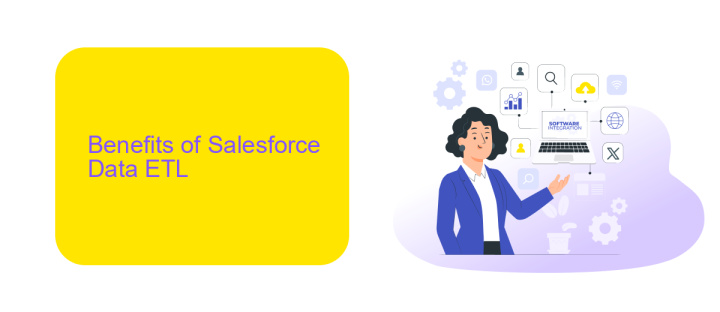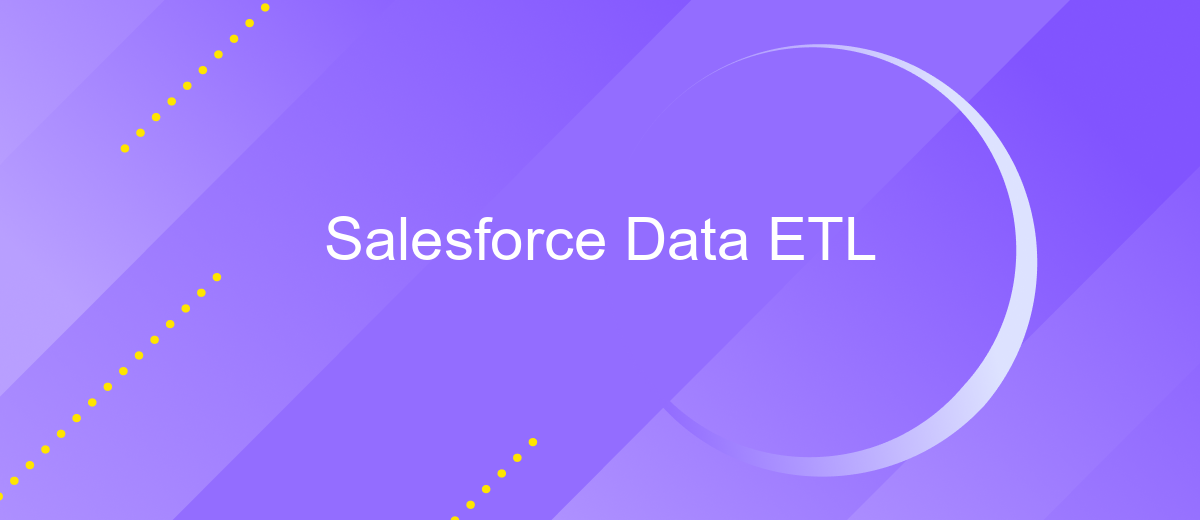Salesforce Data ETL
Salesforce Data ETL (Extract, Transform, Load) is a critical process for businesses aiming to maximize the value of their data. By effectively extracting data from various sources, transforming it into a usable format, and loading it into Salesforce, organizations can enhance data accuracy, streamline operations, and drive informed decision-making. This article explores the key steps and best practices for successful Salesforce Data ETL.
Introduction to Salesforce Data ETL
Salesforce Data ETL (Extract, Transform, Load) is a crucial process for managing and optimizing data within Salesforce. ETL processes enable organizations to extract data from various sources, transform it into a usable format, and load it into Salesforce for better analysis and decision-making. This ensures that the data in Salesforce is accurate, up-to-date, and ready for actionable insights.
- Extract: Collect data from multiple sources such as databases, APIs, and flat files.
- Transform: Cleanse, format, and enrich the data to meet business requirements.
- Load: Import the transformed data into Salesforce, ensuring its availability for reporting and analytics.
Integrating various data sources into Salesforce can be challenging, but tools like ApiX-Drive simplify this process. ApiX-Drive offers seamless integration capabilities, allowing businesses to connect different applications and automate data flows without extensive coding. This enhances the efficiency and reliability of the ETL process, ensuring that Salesforce remains a powerful tool for customer relationship management and business intelligence.
Benefits of Salesforce Data ETL

Salesforce Data ETL offers numerous benefits for businesses looking to optimize their data management processes. By automating the extraction, transformation, and loading of data, companies can save valuable time and resources. This automation minimizes human error and ensures data consistency, which is crucial for making informed business decisions. Additionally, Salesforce Data ETL allows for seamless integration with various data sources, enabling a holistic view of business operations.
Another significant advantage is the ability to customize data workflows to meet specific business needs. Tools like ApiX-Drive facilitate these integrations by offering user-friendly interfaces and robust functionality. With ApiX-Drive, businesses can easily connect Salesforce with other applications, streamlining data flow and enhancing operational efficiency. This results in more accurate reporting, better customer insights, and ultimately, a competitive edge in the market.
Challenges of Salesforce Data ETL

Extracting, transforming, and loading (ETL) data within Salesforce presents several challenges that can complicate the process. These challenges stem from the complexity of Salesforce's data structure, the need for real-time data synchronization, and maintaining data integrity during transfers.
- Complex Data Structures: Salesforce's highly customizable nature can lead to intricate data models that are difficult to manage and map during ETL processes.
- Real-time Synchronization: Keeping data in sync between Salesforce and other systems in real-time is crucial but challenging, requiring robust and efficient ETL tools.
- Data Integrity: Ensuring that data remains accurate and consistent during the ETL process is vital, as any discrepancies can lead to significant business issues.
- Integration Setup: Configuring and maintaining integrations with Salesforce and other platforms can be complex, though tools like ApiX-Drive can simplify this process significantly.
Addressing these challenges requires a combination of advanced ETL tools, thorough planning, and continuous monitoring. Leveraging services like ApiX-Drive can streamline integration setups and help maintain real-time synchronization, ultimately ensuring data integrity and operational efficiency.
Best Practices for Salesforce Data ETL

Effective Salesforce Data ETL processes are essential for ensuring data integrity and operational efficiency. To achieve this, it is important to follow a set of best practices that can help streamline the extraction, transformation, and loading of data.
First and foremost, always ensure data quality before initiating the ETL process. This involves cleaning and validating the data to avoid any inconsistencies or errors. Additionally, always schedule ETL processes during off-peak hours to minimize the impact on system performance.
- Automate ETL processes to reduce manual intervention and errors.
- Utilize incremental data loads to optimize performance and reduce load times.
- Regularly monitor and audit ETL processes to identify and resolve issues promptly.
- Leverage tools like ApiX-Drive for seamless integration and automation of data workflows.
- Maintain comprehensive documentation for all ETL processes and transformations.
By adhering to these best practices, you can ensure that your Salesforce Data ETL processes are efficient, reliable, and scalable. This will not only improve data quality but also enhance overall business operations.


Tools for Salesforce Data ETL
When it comes to Salesforce Data ETL (Extract, Transform, Load), choosing the right tools is crucial for seamless data management. There are several robust tools available that cater to different needs, including MuleSoft, Talend, and Informatica. These tools offer extensive features for data extraction, transformation, and loading, ensuring data integrity and efficient workflows. Additionally, they provide user-friendly interfaces and customizable options to meet specific business requirements.
Another essential tool for Salesforce Data ETL is ApiX-Drive. This service simplifies the process of integrating various applications and automating data flows between them. With ApiX-Drive, users can set up integrations without coding, making it accessible for non-technical users. It supports a wide range of applications and provides real-time data synchronization, which is vital for maintaining up-to-date information across platforms. By leveraging these tools, businesses can optimize their Salesforce data processes and achieve better data accuracy and efficiency.
FAQ
What is Salesforce Data ETL?
How can I automate the ETL process for Salesforce?
What types of data can be integrated into Salesforce using ETL?
How do I ensure data quality during the ETL process?
Can I schedule ETL jobs to run at specific times?
Apix-Drive will help optimize business processes, save you from a lot of routine tasks and unnecessary costs for automation, attracting additional specialists. Try setting up a free test connection with ApiX-Drive and see for yourself. Now you have to think about where to invest the freed time and money!

